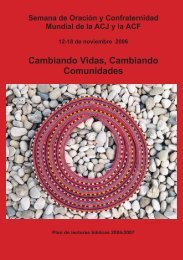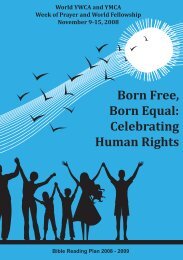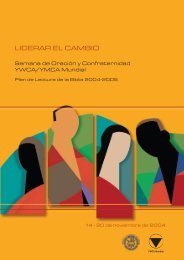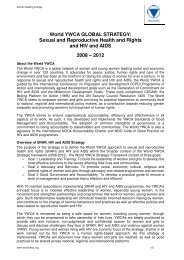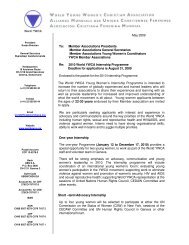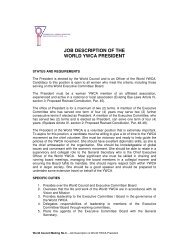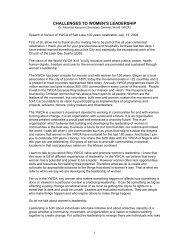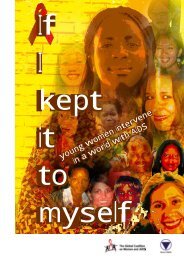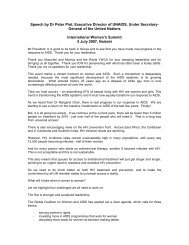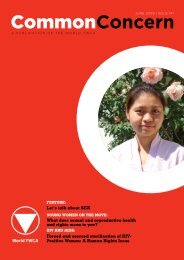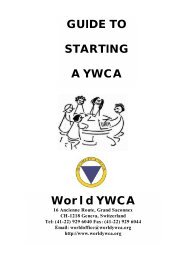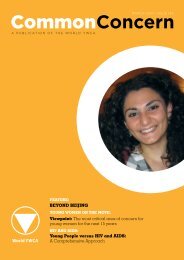Women, Peace and Security Include us, don't ... - World YWCA
Women, Peace and Security Include us, don't ... - World YWCA
Women, Peace and Security Include us, don't ... - World YWCA
You also want an ePaper? Increase the reach of your titles
YUMPU automatically turns print PDFs into web optimized ePapers that Google loves.
CC 6FeatureWOMEN, PEACE<strong>and</strong> SECURITY<strong>Security</strong> Council Resolution 1325 was passed unanimo<strong>us</strong>ly on October 31, 2000.Resolution (S/RES/1325) is the first resolution ever passed by the <strong>Security</strong> Council thatspecifically addresses the impact of war on women, <strong>and</strong> women’s contributions to conflictresolution <strong>and</strong> s<strong>us</strong>tainable peace.When it comes to gender,traditional notions ofsecurity <strong>and</strong> conflictreflect only a narrowreality for women. Human insecuritiesincluding lack of social, political,economic <strong>and</strong> environmental securityprevent women from attaining genderequality <strong>and</strong> empowerment. Whenthere is a lack of security—women<strong>and</strong> girls bear the brunt of the crisis.The impact of conflict, war, poverty<strong>and</strong> even economic crisis on women isoften disproportionate.So, on October 31, 2000, whenthe United Nations <strong>Security</strong> Counciladopted Resolution 1325 on <strong>Women</strong>,<strong>Peace</strong> <strong>and</strong> <strong>Security</strong> it was regarded asgroundbreaking, not only in content butas proof of the achievements that arepossible when NGOs, the UN system<strong>and</strong> member states work together.The UN <strong>Security</strong> CouncilResolution 1325 (UNSCR 1325) putsthe spotlight on three critical areaswhen it comes to gender equalityin the context of conflict, peace <strong>and</strong>security: Participation, Prevention <strong>and</strong>Protection. These 3Ps clearly addressthe constant under-representation ofwomen in formal peace processes,how women can contribute topreventing war <strong>and</strong> conflict <strong>and</strong> thespecific needs of women <strong>and</strong> girlsduring conflict.ParticipationWhen women face violencein the home <strong>and</strong> communitythey often do not have theenergy to fully participatein peace building at thenational, provincial or eventhe local committee level.Since the feminization of povertybecomes even more pronounced inpost conflict economies, potentialfemale leaders may be put offparticipating in the transformativeprocesses of reconstruction <strong>and</strong>rebuilding communities as they caterto basic needs of their families.Ultimately, the full <strong>and</strong> equalparticipation of women during thepeace building processes starts withintervention, funding <strong>and</strong> technicalsupport for women that allows themto both participate <strong>and</strong> meet theirbasic survival needs. But to bridgethe participation gap, women m<strong>us</strong>tbe involved in political process beforeconflict breaks out.Too often women’s opinion onpeace <strong>and</strong> security are not heardbeca<strong>us</strong>e they are excluded fromthe process or their contributions<strong>and</strong> opinions are devalued. Toovercome these obstacles, women’sparticipation m<strong>us</strong>t be deliberatelysought, perhaps through a quotasystem, targeted consultations, theestablishment or strengthening of<strong>Women</strong>’s Ministries or Departments<strong>and</strong> the appointment of female judges,police <strong>and</strong> law reform authorities.<strong>Women</strong>’s formal politicalparticipation in decision-makingat the vital stage of peace buildingdem<strong>and</strong>s more than having women asobservers in decision-making fora <strong>and</strong>it constitutes more than a few womenc<strong>and</strong>idates st<strong>and</strong>ing for elections.Gender j<strong>us</strong>tice <strong>and</strong> equality principlesshould be enshrined in constitutional<strong>and</strong> legal reforms, multi-party systems<strong>and</strong> election processes. Once womenare participating in public life, theyshould be included in decision-makingabout issues beyond gender; theyshould also be included in disc<strong>us</strong>sionsabout security <strong>and</strong> resource allocation.www.worldywca.org



